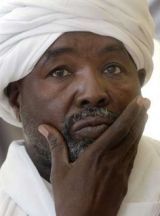Darfur tribal leaders reject UN peacekeepers
June 9, 2006 (AL FASHER) — Tribal leaders on Friday rejected the possibility of U.N. peacekeepers replacing African Union forces in Darfur, with one chief threatening a “holy war” if non-African troops come to the Sudanese region.
 Their concerns emerged as U.N. Security Council members met with Sudanese government and tribal leaders, relief workers and about 15 representatives of displaced people living in volatile camps surrounding this northern Darfur town. The council steered clear of the camps because of security concerns sparked by opposition to a Darfur peace agreement the government and main rebel group signed May 5.
Their concerns emerged as U.N. Security Council members met with Sudanese government and tribal leaders, relief workers and about 15 representatives of displaced people living in volatile camps surrounding this northern Darfur town. The council steered clear of the camps because of security concerns sparked by opposition to a Darfur peace agreement the government and main rebel group signed May 5.
Earlier this week in the Sudanese capital, Khartoum, President Omar al-Bashir told the council his government would move ahead with discussions on replacing African Union peacekeepers with a U.N. force, but he refused to give an immediate green light to the plan.
That reluctance was echoed by tribal and youth leaders invited to meet the council in Darfur, the vast western region ravaged by an ethnic conflict some call a genocide. Fighting has left 180,000 people dead and an additional 2 million homeless.
Mowadh Jalaladin, a representative of the Barty tribe which he said has about 250,000 members, said handing over to a U.N. force “would inaugurate foreign occupation and intervention” and remind Sudanese of their colonial past, echoing earlier government rhetoric that has fanned anti-U.N. sentiment.
The cry also has been taken up by Islamic militants.
The Al-Jazeera satellite channel on Friday broadcast a videotape by the deputy leader of al-Qaida, Ayman al-Zawahri, in which he said the U.N. Security Council visit to Sudan was “to prepare to occupy and divide it.” In a tape aired on Arab television in April, al-Qaida leader Osama bin Laden urged followers to fight any U.N. peacekeeping force in Sudan.
If a U.N. force comes to Darfur, Jalaladin said, “we are declaring jihad against it.
“It means death. It means defending Sudan and Islam,” Jalaladin said.
“The root causes of the Darfur conflict are the doing of the Jewish organizations who financed this armed rebellion,” he claimed. “We don’t want the Security Council to be an instrument of the ugly undertakings of the United States of America.”
Decades of low-level clashes in Darfur over land and water erupted in early 2003 when ethnic African rebel groups rose up against the Arab-led government in Khartoum. The government allegedly responded by unleashing ethnic Arab militias known as janjaweed, who have been accused of some of the war’s worst atrocities. The government in Khartoum denies backing the janjaweed but agreed under the May 5 truce to disarm and dismantle them.
Another tribal chief, Barwd Dusa, took a much more moderate stance but still favored keeping African troops in this vast western region about the size of France.
“We would like for the United Nations to help the African Union in supporting the troops of the African Union in order to enforce the peace agreement on the ground,” said Dusa, who claims his Zagawa tribe also has about 250,000 people.
With the May 5 agreement “our lives changed, we changed, our mind-set changed and we are feeling more reassured and we celebrated … ,” he said. “The overwhelming majority of the population of Darfur in general wants peace.”
He urged the two rebel groups refusing to sign the agreement to drop their opposition “because we cannot take any more war and any more instability.”
Ibrahim Abdurazig, leader of North Darfur’s National Youth Association, also called for the rebel holdouts to sign the agreement and for an “African solution.”
The African Union force “respects the customs and moral values” of the Darfur people, “and they don’t want any foreigners to meddle,” he said.
The 15 council ambassadors were greeted at the airport by over 100 government officials and tribal leaders dressed in traditional white robes and turbans and colorfully dressed women shouting “Alahu Akbar,” or “God is Great.”
Osman Yusouf Kibir, the governor of North Darfur, told reporters that the Darfur leaders had agreed with the council on many issues and welcomed its support.
Asked about Jalaladin’s threat of “jihad,” or holy war, he said the possibility of a U.N. force was being discussed and “we fully respect what transpires out of the interaction between the government and the international community.”
Britain’s U.N. Ambassador Emyr Jones Parry, who is leading the delegation, said the council is trying to make sure the peace agreement is implemented and that conditions in Darfur improve.
“What is vital is that there should be a rapid improvement in the security situation here, especially for the women, and that the humanitarian access must be better assured,” he said.
(ST/AP)
